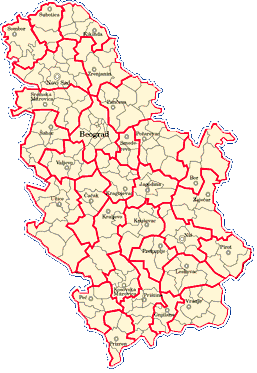|
Districts In Serbia
The territorial order of the Republic of Serbia is regulated by the Law on Territorial Organization and Local Self-Government, adopted in the National Assembly on July 24, 1991. Under the Law, the municipalities, cities and settlements make the bases of the territorial organization.

By its Enactment of 29 January 1992, the Government of the Republic of Serbia defined the state administration affairs that shall be run by the competent Ministries out of their seats, within the districts as regional centers of state authority.
The Republic of Serbia is divided into 29 districts: Borski, Branicevski, Jablanicki, Backa South, South Banat, Kolubarski, Kosovski, Kosovsko-Mitrovacki, Kosovsko-Pomoravski, Macvanski, Moravicki, Nisavski, Pcinjski, Pecki, Pirotski, Podunavski, Pomoravski, Prizrenski, Rasinski, Raski, Backa North, North Banat, Banat Central, Sremski, Sumadijski, Toplicki, Zajecarski, Backa West and Zlatiborski.
|